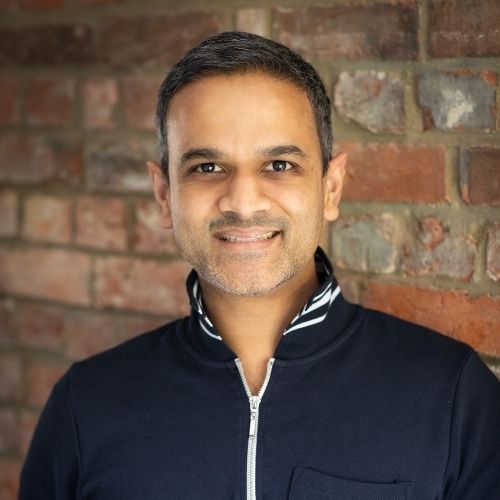Member Profile: Rajeeb Dey MBE, Learnerbly

Rajeeb Dey MBE is a serial entrepreneur, whose work promoting British entrepreneurship has been recognised by the World Economic Forum and the Queen. We spoke to Dey about the journey underpinning his latest venture, Learnerbly.
Dey is the founder & CEO of Learnerbly — an award-winning Performance Enablement Platform. With Learnerbly, high-growth businesses can fill knowledge gaps to help reach business growth, team performance and individual development. Teaching comes in many curated forms: mentors, online courses, articles, videos, and books. Teams in 100+ countries use Learnerbly, including King.com, GoCardless, and HelloFresh.
Prior to this, Dey founded Enternships, a portal connecting students and graduates to roles in 7000+ fast-growing businesses. Dey co-founded StartUp Britain, a campaign promoting British entrepreneurship, that was launched by Prime Minister David Cameron in 2011. Dey has also served for over 10 years as Trustee of UnLtd, a foundation promoting social entrepreneurship.
In 2012, Dey was recognised as the world’s youngest Young Global Leader (at 26) by the World Economic Forum. A year later, Dey received the Queen’s Award for Enterprise Promotion. For his services to entrepreneurship, Dey was appointed Member of the British Empire (MBE).
Tell us about the founding of Learnerbly?
Having helped thousands of employers hire great talent in my previous business, Enternships, I noticed a new market ripe for disruption: attracting, developing and retaining the best people. Employees want to know how their employers will be investing in their growth. Many businesses do not have a Learning and Development team and if they do, they cannot be experts in all business aspects. How do they begin to sift through the content out there and choose the best resources for employees?
I also felt that there was no quality control in the world of professional development, anyone can be a coach. For example if you want to improve your public speaking, where do you go? While I have been lucky to benefit from a trusted community of fellow founders whom I could ask, I realised most people in business don’t have such a trusted network of peers. This sparked the idea for a curated marketplace for professional development.
Learnerbly addresses that employees learn in different ways. Some like to read books, others prefer to watch a video, whilst another may want to listen to a podcast. Corporate learning to date has been dominated by one method – e-learning videos delivered by a single vendor – such as LinkedIn Learning. With Learnerbly employees can choose what and how they learn from the best providers, including Pluralsight, Masterclass, Amazon Books, New York Times, Headspace and more.
Employers no longer need to manage enterprise-wide subscriptions to multiple vendors and hope that employees use them. Instead they can bring in Learnerbly and let employees choose and pay for content at the point of need.
We’re disrupting the way corporate learning is procured, at a time when up-skilling and re-skilling are vital. And we are proud to be improving employee learning experiences globally.
What have been the biggest challenges in scaling?
Fundraising is always challenging. But the largest teething problem as we have grown has been maintaining and evolving our company culture.
To ensure that our open and enabling philosophy remained intact, we have invested heavily in our people processes. From the early days we were keen to listen to employee feedback and adjust. The process will become even more interesting and complex as we embark on expanding our team in the US!
What does the future hold for you?
We’re evolving the platform to ensure we can better connect learning with company goals and priorities. We’re also working to better understand the skills employees need to develop, in order to continuously improve our recommendation engine. We have some exciting developments up our sleeve for our product so watch this space!
Additionally, expanding across the pond is a key priority for 2023. I’m currently based in London, so I will be spending a lot more time out in the US. We’re sponsoring a large HR Tech conference in Vegas called Transform, which is a great opportunity to get the word out about our brand in this new market.
Do you have any advice for future founders in EdTech?
Start developing your network early on. If you have an aspiration to start something, start socialising the idea with people. Speak to experts and advisors. The saying, “it’s not what you know, but who you know” is sadly true. Make that to your advantage. Connections can shortcut your route to success, whether that be winning your first client or getting access to your first investor. It’s never too early or late to start developing your network. The key is not to fixate on what you can get from contacts, but also what you can give. Find ways to add value to your network. I’m a big believer in paying it forward. My first seed investor was someone I’d known many years prior, when he was a founder himself; similarly, some of our early clients were people who I knew from previous paths.
On a closing note, what’s the best business book you’ve read?
I have two suggestions. “The Hard Thing about Hard Things” by Ben Horowitz is a good depiction of the highs and lows of an entrepreneur. For a more sales-leaning founder like myself, “The Sales Acceleration Formula” by Mark Roberge was also full of useful insights, highlighting how to structure and scale a commercial function in a business.

